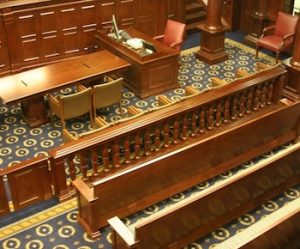 Comcast Ip Holdings I Llc v. Sprint Communs. Co., L.P., (Fed. Cir. Mar. 7, 2017) (Before O’Malley, Reyna, and Chen, J.) (Opinion for the court, Chen, J.)
Comcast Ip Holdings I Llc v. Sprint Communs. Co., L.P., (Fed. Cir. Mar. 7, 2017) (Before O’Malley, Reyna, and Chen, J.) (Opinion for the court, Chen, J.)
The Federal Circuit affirmed a jury award of $7.5 million for Sprint’s infringement of three Comcast patents. The district court did not error in construing the challenged claims, there was sufficient evidence to support both the jury’s verdict and the award of prejudgment interest.
The patents deal with methods of using Domain Name Systems technology, such as the internet, to initiate and route phone calls. Comcast accused Sprint of using two groups of infringing methods for routing calls: calls originating on their wireless cellular network and traveling through an Internet Protocol Multimedia Subsystem (IMS) network; and a process by which Sprint routed calls through the IMS network. Sprint moved for JMOL and a new trial, which was denied, and appealed.
The Federal Circuit upheld the district court’s claim construction. For the first challenged construction, “Switched Telecommunications System”, the Court found that Sprint had not demonstrated prejudice. “We may affirm the jury’s findings . . . if correction of errors in claim construction would not have changed the verdict, given the evidence presented. . . . Prejudicial error here requires ‘sufficient evidence . . . to support a finding of non-infringement under a correct construction.’”. The Court additionally found Sprint’s construction unpersuasive because the patent did not, in fact, require a call to travel “exclusively” on only a subset of the network. Sprint also challenged the construction of “parsing.” The challenge was found to have been waived because Sprint failed to argue prejudice.
Sprint also challenged the sufficiency of the jury’s findings of infringement. Sprint argued that the “call destination” limitation was not met, based on its ordinary meaning. The Court disagreed. It found that the word “a” before the first use of the term call destination implied there could be more than one destination. It also found there was sufficient expert testimony to support the jury. The Court characterized the argument one of claim construction, not sufficiency of evidence, which was untimely. The Court found that the sufficiency of another limitation, the “identifier of a second party,” was infringed for the same reasons.
Finally, the Court affirmed the prejudgment interest award. Based on the lump sum award by the jury, it was reasonable for the district court to award interest based on the earliest date of infringement of the three patents (and therefore the date of the hypothetical negotiation). That is, the district court had no basis and no need for apportioning the prejudgment interest.
On appeal, the substantial evidence inquiry corresponds to the court’s claim construction. Efforts to show insubstantial evidence for a newly elaborated claim construction will fail as untimely; as when a stipulated “ordinary meaning” is revisited for the appeal.
[Troutman-Ad]
[Troutman-About]

![[IPWatchdog Logo]](https://ipwatchdog.com/wp-content/themes/IPWatchdog%20-%202023/assets/images/temp/logo-small@2x.png)


![[Advertisement]](https://ipwatchdog.com/wp-content/uploads/2024/04/Artificial-Intelligence-2024-REPLAY-sidebar-700x500-1.jpg)
![[Advertisement]](https://ipwatchdog.com/wp-content/uploads/2024/04/Patent-Litigation-Masters-2024-sidebar-700x500-1.jpg)

![[Advertisement]](https://ipwatchdog.com/wp-content/uploads/2021/12/WEBINAR-336-x-280-px.png)
![[Advertisement]](https://ipwatchdog.com/wp-content/uploads/2021/12/2021-Patent-Practice-on-Demand-recorded-Feb-2021-336-x-280.jpg)
![[Advertisement]](https://ipwatchdog.com/wp-content/uploads/2021/12/Ad-4-The-Invent-Patent-System™.png)






Join the Discussion
No comments yet.